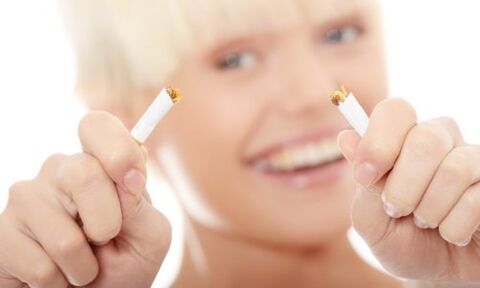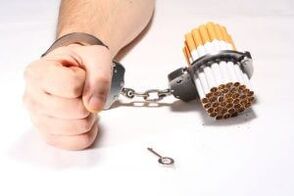If a person stops smoking, the consequences for the body can be bad. The WHO classifies smoking as one of the most serious threats to human life and health. Every year about 7 million people die from tobacco causes. Researchers say that one smoker dies every 5-7 seconds in the world. If the rate of tobacco use does not decrease, then by 2030, according to researchers, 9 million people will die as a result of smoking each year.

The effects of cigarettes on the body
Carcinogens that enter the body with smoke affect almost every human organ and increase the risk of exposure:
- COPD (chronic obstructive pulmonary disease);
- cancer (lung, larynx, colon, pancreas);
- cardiovascular disease (heart attack, stroke);
- impotence and infertility;
- lesions of the nervous system (multiple sclerosis).
The paradox of the current situation is that smoking is a preventable cause of death! All that remains is to forget bad habits.
But if it’s that simple, why do WHO numbers look so scary?
Not just a habit
The fact is that smoking is not just a bad habit, but a psychological and physiological dependence of the body.

The first time, as a rule, the desire to try cigarettes arises in the smoking company. Everyone around smokes, the desire to stand out from potential smokers is not observed. One hand held out a cigarette, and now you were no longer sitting on a cheerful black sheep: you were like everyone else.
This is a psychological addiction. It is pre -formed. In the future, smoking is delayed and becomes a certain ritual: smoking with a cup of coffee or in the morning. Smoking under stress, calming down, smoking while working, problem solving - all of these are psychological addictions, the most difficult to get rid of. Or completely impossible. Someone quits smoking, doesn’t keep a cigarette for several years, but doesn’t feel relaxed in the company of smoking. A former smoker must always control his desires and control himself.
Over time, physiological addiction is added to psychological dependence.
A person who is not addicted to tobacco will feel unwell after smoking two cigarettes in a row. Smokers will not feel anything. The body, accustomed to tobacco, works in different ways, it is addicted to nicotine and already knows how to react to its intake. Nicotine is supplied and the brain releases the hormone dopamine to neutralize it, which provides a sense of satisfaction.
Ways to handle a cigarette
Only about 5% of tobacco addicts can quit smoking on their own. 80% want to quit, but can’t cope without a doctor’s help. Modern medicine uses a variety of ways to help tobacco addicts:
- Psychotherapy methods. Doctors help overcome withdrawal syndrome and find pleasure in life that replaces cigarettes.
- Gums or patches that contain nicotine. They help overcome the unpleasant symptoms associated with quitting smoking, gradually releasing nicotine into the body. Proper use of this therapy is very important, otherwise you will not be able to achieve the desired results.
- Reflexology (acupuncture, electropuncture, moxibustion, acupressure). The method is not known by evidence -based medicine, but, according to former smokers, is meaningful and beneficial.
- Medications. Prescribed only by a doctor.
There is still a chance to cope on your own. At the very least, the hard road to quitting smoking begins. Those who have quit smoking share various suggestions. They advise you to make yourself a couple, because together is more fun; tell everyone about your intentions - then it’s a shame to back off; if desired, pull out drinking water, chewing gum, carrots.
If you decide to solve the problem yourself, use the following tips:
- Set a specific day to quit smoking.
- Find something for the first time - the right sport.
- Remove everything reminiscent of tobacco: matches, ashtrays, lighters. Do not keep cigarettes in the house.
- Get enough sleep. Limit your TV viewing. This will help relieve fatigue and irritability.
- Water helps relieve withdrawal symptoms. Start and end your day with a warm shower.
Rupture syndrome, or withdrawal

Quitting smoking leads to nicotine withdrawal, or withdrawal symptoms. Over the years, nicotine has been incorporated into all important processes and has an effect on most human organs. It is clear that the process of reorganizing the body in a new way causes a number of various negative sensations.
Let’s take a look at the main problems that literally every tobacco user faces.
- Weakness, dizziness, decreased performance. They occur in the first weeks after nicotine withdrawal. Surveys of ex -smokers show that these symptoms disappear within the first two weeks.
- Weight gain. Nicotine slows down the rate of metabolism. If you quit smoking, you run the risk of gaining excess weight. Stop smoking? Start monitoring your diet and increase your physical activity. Exercise also helps get rid of obsessive thoughts.
- Shortness of breath, increased sputum production, cough. Tobacco smoke interferes with the respiratory tract and increases phlegm production. As a result of nicotine withdrawal, airway stimulation ends, and it is difficult for the person to cough. This condition can be regulated by physical activity, which can also stimulate the bronchi naturally and eliminate phlegm. If this condition lasts longer, it makes sense to see a doctor.
- Constipation. Nicotine stimulates the digestive tract. Without nicotine, your gut needs time and proper nutrition to make it work.
Practice shows: an integrated approach to getting rid of addiction can achieve positive results.
Consequences for the body
There is no easy path in this matter. Strength, patience, and complete confidence in your own truth guarantee the successful success of what you start. The increase in the body will not last long:
- On the first day, the level of carbon monoxide in the blood decreases, saturated with oxygen.
- By the end of the first week, nicotine is completely removed from the body. Physical addiction has been defeated.
- By the end of the first year, the risk of developing cardiovascular disease is reduced by 2 times.
- Within 10 years, there is a complete recovery of the body.
It's worth it. Be healthy!























